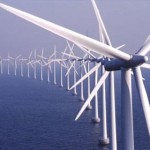Wind power has taken some hits with the New Year.
A proposed 145-acre, 20-megawatt project in Clarke County is being scuttled because Dominion Resources has shown little interest in buying its power. In New England, a pioneering offshore wind project, Cape Wind, is on the ropes because of the merger of two utilities and opposition by one of the Koch brothers.
According to the Winchester Star and blogger Iveymain, OCI Power is pulling the plug on its plan to erect 100,000 solar panels – enough to power 20,000 homes –due “due to the lack of long-term solar procurement efforts by Dominion and other VA utilities.”
There is no clear program in Virginia to push solar power. The General Assembly and Gov. Terry McAuliffe have paid lip service to the idea but haven’t done anything to actually fund it. Moreover, Virginia has no mandatory renewable portfolio standard as do other states so efforts for renewable energy are set up to dawdle. Dominion also has been slow, if not downright negative, about buying renewable party from third party sources.
Cape Wind off Cape Cod had been might have been the nation’s first real offshore wind farm. It would run 130 turbines in Nantucket Sound with electric utilities buying the output.
But the project’s price tag of $2.5 billion seemed daunting. One group, National Grid had agreed to buy half the power, but another utility, NStar, wanted to drop its interest in the project when it was being taken over in a $17.5 billion merger with Northeast Utilities.
Cape Wind had drawn opposition from people one might expect, such as conservative activist William Koch, who owns millions of dollars’ worth of seafront vacation real estate, but also from odd sources such as the late TV anchorman Walter Cronkite who likewise owned waterfront land.
Closer to Virginia, there have been auctions of offshore areas from wind farms. Dominion has about $50 million in federal funds to build two, six-megawatt turbines 27 miles off the Virginia shore. Dominion says it wants to develop wind, but the reality is that it wants to take tiny steps to it while dominating the market.
Another factor is the rush to natural gas that has Dominion and other regional utilities pitching billions worth of pipelines. Cheap gas hurts renewables because it takes away the urgency to get them going.
That may change. There is so much gas and oil, in fact, that drilling is slowing quickly. Petroleum prices are way low. This is a normal cycle. When production slows because of low prices, supply will likewise diminish. When that happens, prices will rise and drilling will be robust again.
The problem is really an economic one. As long as natural gas remains in its current cycle, it’s going to be really hard to force a play into wind – at least – without some kind of top-down, government involvement. Dominion, once again, is getting away with playing it just as it wants.



